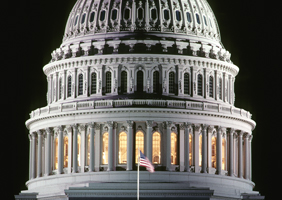Newsroom
Automatic forgiveness, hold harmless provision needed, NAFCU tells senators
 Ahead of today's Senate Small Business Committee hearing with Small Business Administration (SBA) Administrator Jovita Carranza and Treasury Secretary Steven Mnuchin, NAFCU's Brad Thaler commended efforts to make the paycheck protection program (PPP) successful but noted more needs to be done to ensure smaller lenders and borrowers are not overly burdened by the process.
Ahead of today's Senate Small Business Committee hearing with Small Business Administration (SBA) Administrator Jovita Carranza and Treasury Secretary Steven Mnuchin, NAFCU's Brad Thaler commended efforts to make the paycheck protection program (PPP) successful but noted more needs to be done to ensure smaller lenders and borrowers are not overly burdened by the process.
The most recent data from the SBA showed that 721 credit unions with less than $1 billion in assets have participated as lenders in the PPP, providing $2.8 billion in loans.
In the letter sent Tuesday, Thaler, NAFCU's vice president of legislative affairs, noted that changes made to the PPP by the recently enacted Paycheck Protection Program Flexibility Act (H.R. 7010) "will help address a number of concerns" to ensure borrowers can use the funds effectively to meet their needs.
However, Thaler asked that senators seek clarification from the SBA if several of the provisions are retroactive or will give borrowers the ability to reapply for forgiveness. NAFCU President and CEO Dan Berger also sent a letter to the SBA Tuesday calling for these clarifications.
As lawmakers and the SBA and Treasury continue to pursue improvements to the PPP, Thaler specifically asked for them to enact clarifications to the lender hold harmless provision to "provide important protections for credit unions and other community institutions who are working hard to assist small businesses with PPP loans," which "will increase the confidence of lenders under this program."
He also shared NAFCU's support for simplifying the loan forgiveness process for smaller PPP loans, including by offering automatic loan forgiveness for loans less than $150,000.
"This level would cover the majority of credit union loans, the vast majority of which have been to smaller businesses that could most benefit from this automatic forgiveness," Thaler wrote. "A smaller PPP loan is less likely to pose a high risk of fraud so the benefits to small businesses and lenders of providing this automatic forgiveness significantly outweigh the potential risks. Moreover, automatic forgiveness frees up human capital at a time when credit unions and small businesses may be short-staffed due to ramifications of COVID-19."
Relatedly, SBA and Treasury guidance have provided a safe harbor for PPP loans of less than $2 million "will be deemed to have made the required certification concerning the necessity of the loan request in good faith," and Thaler noted the SBA has the ability to review any loans up to six years after the date the loan is forgiven or repaid in full to investigate fraud.
NAFCU remains in close contact with lawmakers and the SBA and Treasury to obtain more guidance and support for small lenders under the PPP. As the Senate considers Phase 4 relief provisions, Berger urged lawmakers to strengthen the PPP by ensuring timely, clear guidance, providing more funds and asides for Community Development Financial Institutions (CDFIs) and minority depository institutions (MDIs), and establishing a lender hold harmless provision.
Stay tuned to NAFCU Today for the latest developments related to the PPP; access NAFCU's newly updated version of its PPP FAQs.
Share This
Related Resources
The Ride-Share Conundrum: An Exception to an Exception
Business Lending
Blog Post
Taking Care of Business: Recent Developments in Commercial Lending
Business Lending
Blog Post
Marijuana Banking Issue Brief
Whitepapers
Loan Maturity Issue Brief
Whitepapers
Get daily updates.
Subscribe to NAFCU today.
